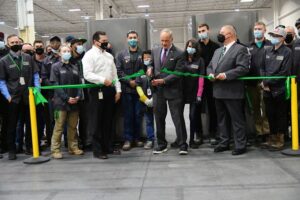Efficient and cost-effective compression of hydrogen is essential for its successful establishment as an energy carrier in industry or as a fuel for mobility. With innovative electrochemical compression, costs could be massively reduced, and a high degree of efficiency and availability could be achieved. This is exactly what ZBT and Theisen GmbH are investigating in the joint project ‘InnoKomp’. They are building a robust electrochemical compressor system based on HyET’s technology and testing it on ZBT’s hydrogen test field.
An electrochemical hydrogen compressor (EHC) consists of an electrochemical cell with an anode of a PEM fuel cell, a membrane electrode assembly (MEA) and a cathode of a PEM electrolyser. Compression is by means of isothermal compression (as opposed to adiabatic mechanical compressors), promising greater efficiency. With no moving parts, lower maintenance costs and higher availability as well as significantly lower noise emissions are also expected. The cell architecture of the stacks (comparable to a fuel cell) allows – unlike conventional compressors – easy modular scaling of the compressor capacity.
Within the scope of this project, Theisen, with the support of ZBT, will develop, build and commission a container-based compressor system with a delivery capacity of 10 kg/d of hydrogen and realisable output pressures of up to 400 bar based on HyET’s cell technology. Certification of the system is being prepared.
In parallel, a test environment is being set up at ZBT’s hydrogen test field so that the system can then be subjected to an extensive test programme over several months. The characterisation should make it possible to better understand this new compression process and also to compare it with already established technologies.






